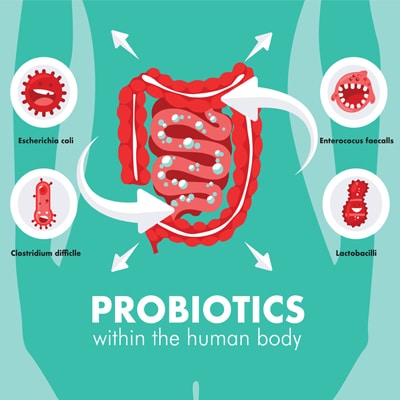Are Probiotics Adding Fuel to Your SIBO Fire?
We’re all told to load up on probiotics for good gut health.
It adds to your thriving gut bacteria ecosystem to help with digestion, absorption, and motility. These live bacteria also do wonders by helping rebalance gut dysbiosis – but only in certain cases.
Having a diverse gut microbiome is important for gut health.
And when you take probiotics or eat fermented foods rich in probiotics such as yogurt or kimchi it adds beneficial bacteria to your gut’s diverse community.
But why are your probiotics not helping with your uncomfortable bloating and gastrointestinal symptoms?
We’re not swinging the pendulum here on probiotics and outright saying they’re bad. But if you’re taking probiotics for complementary SIBO treatment and still have uncomfortable issues – it might just be your probiotic.
Research shows how SIBO is commonly associated with irritable bowel syndrome (IBS) and could be the underlying root cause of up to 80% of people with IBS.
Because of this connection, if you struggle with IBS symptoms, your probiotics could be making your IBS worse as well.
When Probiotics Take Action
Probiotics are living organisms and when you take probiotics you add to the diverse healthy community of gut bacteria located in your colon.
When there’s an imbalance of bacteria you can start to have gastrointestinal issues, which can then lead to other major health conditions.
Probiotics are claimed to help with the imbalance.
But the tricky part comes in when you’re battling with SIBO or IBS symptoms. This is because when you take probiotics you start to multiply the overgrowth of bacteria in your small intestine – a place where they’re causing harm.
A Quick Run Down of SIBO
Small intestinal bacterial overgrowth is where bacteria from your colon migrate to your small intestine. They give off gas byproducts – and lots of it – because they have first dibs on fermenting your food when it comes through your gastrointestinal tract.
And since your small intestine doesn’t absorb gas as well as your large intestine it gets trapped leaving you with gastrointestinal symptoms such as:
- Bloating
- Gas
- Abdominal cramping
- Constipation
- Diarrhea
Small intestinal bacterial overgrowth happens because of a “shock” in your intestines. This trigger upsets the normal flow, stomach acid production, and motility of your gut and bacteria, which induces gut dysbiosis – an imbalance of gut bacteria.
A few major causes of SIBO include:
- Multiple rounds of antibiotics
- Diet high in sugar and refined carbohydrates
- Low stomach acid
- Bowel surgery
- Food poisoning (acute gastroenteritis)
- Certain medications such as NSAIDs, proton-pump inhibitors, and oral contraceptives
- Stress
- Irritable bowel syndrome
- Infection
- Hypothyroidism
- Migrating motor complex dysfunction
- Ileocecal valve dysfunction
These SIBO risk factors can lead to bacteria showing up and making themselves comfortable in the wrong place – your small intestines.
What Probiotics Are You Taking?
Bacteria connected to SIBO aren’t necessarily defined as “good or bad” bacteria.
They’re regular residents in your colon, which now are residing in the wrong place- your small intestine.
Bacteria which have been found in the small intestine of SIBO patients include the following species:
- Lactobacillus
- Bifidobacterium
- Bacteroides
- Enterococcus
- Streptococcus
- Escherichia coli
- Staphylococcus
- Clostridium
Probiotic supplements and probiotic rich-foods tend to have these same gut microbes included in them.
So taking probiotics can make your SIBO or IBS symptoms of stomach pain and bloating worse because you’re simply adding more fuel to the fire, by putting more bacteria in the wrong place.
This gives them strength in numbers to produce more gas – exacerbating your SIBO and IBS symptoms.
Not All Probiotics Are Bad for SIBO
Probiotics are live culture bacteria.
Because of this, enteric coated probiotics have the potential to deliver the bacteria to the small bowel, which should be a sterile environment.
Adding more bacteria to the small bowel can complicate a bloating or SIBO issue.
Non-enteric coated probiotics are not the same as enteric coated.
For example, yogurt, kefir and other fermented foods are fine because they pass through the stomach and are digested and broken down before reaching the small intestine.
Atrantil’s Polyphenol Prebiotic Supplement for Gut Health
If you’re one of the many in which probiotics make your IBS or SIBO symptoms worse Atrantil’s polyphenol packed supplement could be your answer to relief.
The phytonutrients found in Atrantil’s natural ingredients are able to eliminate the overgrowth of bacteria residing in your gut.
Not only do they break down the cell walls of these hostile bacteria, but they stay together long enough to enter your colon and feed your healthy bacteria. It’s like a two for one deal!
Atrantil’s ingredients are unique.
They target the gut stay stabilized enough to do their job in the small intestine and move to the large intestine for further benefits.
Proanthocyanidin found in Atrantil’s natural ingredient Quebracho is one of the most stable polyphenols when exposed to your gastric acids and enzymes.
And Atrantil is the only one having a patent for Quebracho.
Breaking the imbalance of bacteria in your small intestine is crucial to healing SIBO and IBS.
With Atrantil it does just that – rebalances your gut bacteria while promoting postbiotic effects.


Hi NCR, 63 year old male, Ive had chronic belching for years, it comes and goes, took PPI for acid reflux for 2 years then stoped. 6 months ago my PSA doubled, I experienced pelvic distress, perineal burning, cramping, painful stools, and debilitating brain fog. No evidence of obvious prostate infection and neg biopsy. Prostatitis is what we concluded. Quercetin helped with symptoms except the brain fog. Next I discover I have Rosacea Acne, episodic restless legs syndrome, beginnings of Ocular Rosacea and recurrent belching. I ordered a home breath test and neg for hydrogen and methane, <6. Reading your website was very insightful. The articles showed me many of my symptoms point to SIBO/IBS and how closely interrelated they are with Prostatitis. After 7 days on Cipro preparing for the biopsy it was like someone turned on the light, I was awake, alert, focused and felt like my old self. 2 weeks later my brain fog was worse then ever and continues for months. I started Atrantil 7 days ago 3 x 3 per day, Quercetin 500 MG 2 x per day along with the SCD. My rosacea is resolving rapidly. My brain fog is about 40% reduced so far. Hard stools no change. If this fails after 30 days I plan to talk with my Doc about Rafaxmin therapy.
Will adding a stool softener interfere with the effect of Atrantil in the large intestine/colon?
Thank you so much for all that you do!
Hi Richard,
Thank you for contacting us. We are so happy that you have had some relief while on Atrantil and also that you have gained some insight from our website/articles!
Yes, it is ok to take a stool softener while taking Atrantil.
Once Atrantil has had time to work, hopefully you can stop taking the stool softener all together.
Thank you and best wishes,
Team Atrantil
Hello my doctor put me on cipro and alinia antibiotics. Would it be best for me to take this with the antibiotics or after? Also how can I make sure I get good flora in the large intestine and not in the small intestine again? I’m confused if I can’t use probiotics.
Hi Noel,
Thank you for your interest in Atrantil! It is ok to take Atrantil while taking antibiotics, but we do recommend spacing Atrantil at least an hour apart from the time you take the antibiotics. The best way to diversify your microbiome in the colon is to eat a diverse diet, rich in polyphenols. In fact, Atrantil is packed full of polyphenols and actually acts as a prebiotic in the colon to nourish the microbiome. If you wish to take probiotics, we recommend taking spore based probiotics, which will not populate in the small intestine. We hope this helps to clarify.
Best wishes,
Support Team
I really need some guidance. I have had severe bloating, gas and pain on my left side since 11/17/19. I took 14 days of Xifaxan 12/31-1/13 which cleared the diarrhea. Started taking Atrantil 1/24 off and on till 2/1 when I started 2 pills 3x/day. I finally got in for a SIBO breath test 3/3/20 and it came back negative! Could the Atrantil cause a false negative like prescription antibiotic do? And why hasn’t the Atrantil helped with symptoms yet? Please advise as I am truly at my end.
Hi Melissa,
Thank you for contacting us. No, Atrantil has not been known to cause a false positive like prescription antibiotics. Unfortunately, without being able to do a medical exam, it is hard to say what is going on. We do know that some people have had great results when consistently taking 3 capsules 3 times per day. Also, we recommend stopping probiotics and sticking to a low-carb diet until symptoms have been resolved. However, it is hard to say what else you may have going on. We recommend seeing a health care provider to see if there may be another underlying cause of your symptoms. We hope this helps.
Best wishes,
Support Team